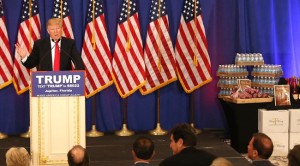
Bannon stepped down from Breitbart to join Trump’s campaign, but the site remained a loyal propaganda arm.
We’ve now had time to digest a week’s worth of President-elect Donald J. Trump stories. Already the prospects for democracy, civil rights and the environment look very dim. Far from “draining the swamp,” Trump is staffing his entire administration with lobbyists, corporate executives, and a cadre of far-right operators. But among the most ominous developments are Trump’s continued assault on the press and his appointment of Stephen Bannon as chief strategist and senior counsel.
The appointment has become a lightning rod of criticism for the incoming Trump Administration due to Bannon’s operation of Breitbart News. With Breitbart, Bannon has been accused of – and admitted to – providing an online safe space for the alt-right, a loose assortment of far-right internet trolls, racists, porn addicts, and even white nationalists. As a clue to the audience Bannon attracts, American Nazi Party Chairman Rocky Suhayda and former KKK grand wizard David Duke applauded his hire.
Breitbart makes a conscious attempt to roll back hard-fought societal gains. If an idea has been deemed politically incorrect, no matter how good the reason, Breitbart will treat it as a lost art form in need of a comeback. With almost giddy verve its writers defend bullying, hazing, white identity politics, fat-shaming, stereotypes of black crime and sex discrimination. In the world of Breitbart and the alt-right, social barriers to such abuses have made America weak.
In addition to intellectualizing cruelty and discrimination, Breitbart operates essentially as a propaganda arm of the Trump campaign, leading some in the media to characterize Bannon as Trump’s Joseph Goebbels. As more Americans get their information from polarized social media, this could be especially dangerous. Stories from Breitbart – in other words, White House propaganda disguised as news – will dominate conservative social media feeds. This will further isolate and misinform Trump supporters, many of whom already use the actual Nazi word Lügenpresse – “lying press” – to describe mainstream media.

Trump, seen here campaigning for president and hawking cheap wares in the same moment.
Their distrust is not entirely unwarranted. Collusion between the Clinton campaign and corporate media included inviting members of the press to fancy dinners, timing the release of stories, and coordinating directly with certain reporters. But Trump is far from innocent of such corruption. In her new book, FOX anchor Megyn Kelly writes, “I was not the only journalist to whom Trump offered gifts clearly meant to shape coverage.” And while critical Clinton stories did appear in mainstream media, conservative media – from FOX to Breitbart to talk radio – supported Trump with nearly total uniformity.
One thing Trump demonstrated considerable skill at during the campaign was media manipulation. He brazenly lied at rallies, debates and in interviews, knowing the media wouldn’t fact-check him in any meaningful way and that even if they did, supporters wouldn’t believe them. He perfected the art of denial, labeling every allegation a falsehood or a conspiracy. Networks provided him free infomercials to sell steaks and promote new properties. On one night, multiple networks devoted extensive coverage to his empty stage.
What media Trump can’t manipulate, he is keen to smash. In the week since his election he has steadily attacked The New York Times on Twitter. For almost a year his campaign carried an ever-growing list of banned media outlets. One of his most authoritarian campaign promises was to “open up” America’s libel laws so that he can sue news outlets over unfavorable coverage. He is conditioning supporters not to trust any source of news without his permission.
Trump’s war on press freedom will likely make him the most difficult president in American history to cover. Establishment media is uncertain about how much access they’ll have to his White House. Throughout the campaign Trump made clear which journalists he liked and, more dangerously, which he didn’t. In addition to Trump’s own vindictiveness, rabid supporters have issued threats to journalists who dare to be critical. Despite wide coverage of the intimidation, Trump has yet to condemn it.
As president, Trump will have his very own state-run media platform in the form of Breitbart. It will be very difficult to reach the audience captured by that propaganda arm. Combined with Trump’s authoritarian streak, this moment in American history leaves serious doubt about the future of the first amendment, if not the republic itself. Despite mainstream media’s failures in this election, real journalists must be protected, promoted and supported now more than ever.
